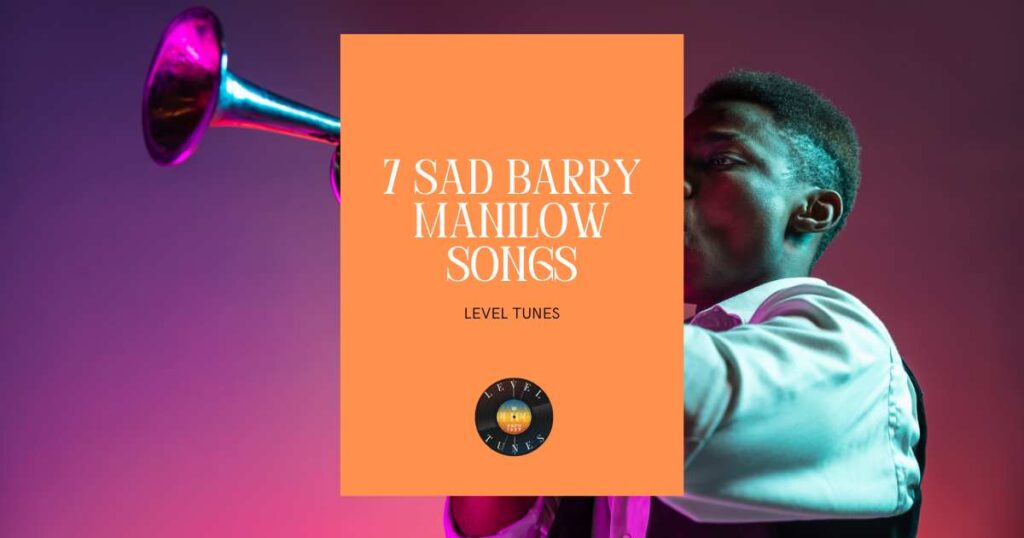7 Sad Barry Manilow Songs: The Ultimate Sad Song
Hey there, fellow music lovers and DJs! TBone here, coming at you from Level Tunes, where I’ve been spinning tracks and sharing my passion for music for over 20 years.
Today, I’m diving deep into the emotional world of Barry Manilow, an artist whose songs have touched the hearts of many. I’ve curated a list of 7 sad Barry Manilow songs that have resonated with me personally and professionally.
Why these songs, you ask?
Well, in my two decades in the music industry, I’ve seen how powerful music can be in conveying emotions and connecting people.
Barry Manilow’s masterful storytelling and melodic prowess have made these tracks timeless classics.
Whether you’re a fellow DJ looking to add some emotional depth to your sets or a music lover seeking solace, these songs are sure to move you. So, let’s dive into the soul-stirring world of Barry Manilow’s music together.
Here are the Sad Barry Manilow songs that you can check out:
List Of Sad Barry Manilow Songs
Sad Barry Manilow songs in a list format:
Mandy
“Mandy” is a classic that showcases Barry Manilow’s ability to convey deep emotion through music. Originally released in 1974 on the album “Barry Manilow II” under the Bell Records label, this song became Manilow’s first number one hit. What makes “Mandy” so special is its story of lost love and regret, wrapped in a melody that’s both haunting and beautiful. The piano-driven arrangement complements Manilow’s heartfelt vocals perfectly, creating a sense of longing and melancholy that’s palpable. This song resonated with me early in my career, teaching me the power of a ballad to connect with an audience’s emotions. The orchestration, featuring a mix of strings and horns, elevates the song’s emotional weight, making “Mandy” a timeless piece that continues to move listeners.
Looks Like We Made It
Released in 1977 on the “This One’s for You” album under Arista Records, “Looks Like We Made It” is another testament to Manilow’s songwriting prowess. Despite its seemingly optimistic title, the song delves into the bittersweet nature of a relationship that has ended, with both parties finding success apart from one another. The irony of the title contrasted with the song’s content is striking, and it’s this clever songwriting that has always drawn me to Manilow’s work. The lush orchestration and Manilow’s expressive delivery make it a powerful piece about love, loss, and moving on. The song reached the top of the charts, and its complex emotional layers make it a favorite for those late-night reflective moments in my DJ sets.
Even Now
“Even Now,” the title track from Manilow’s 1978 album released under Arista Records, is a poignant ballad that speaks to the heart’s resilience amidst longing and loss. The song’s narrative centers on the lingering feelings one has for a past love, even against the passage of time. What always strikes me about “Even Now” is its raw emotional honesty, coupled with Manilow’s sincere vocal performance. The orchestration is understated yet powerful, with strings and piano highlighting the song’s melancholic mood. It’s a masterpiece of emotional storytelling that has influenced my understanding of how music can mirror the complexities of the human heart.
I Made It Through the Rain
Featured on the 1980 album “Barry,” released under Arista Records, “I Made It Through the Rain” is a song about resilience and overcoming adversity. While it carries a message of hope, its inclusion here is due to the emotional journey it describes—making it through tough times and finding oneself stronger on the other side. The song’s arrangement, with its blend of soft rock and orchestral elements, supports Manilow’s vocal storytelling with grace and strength. This song has been a personal anthem for me during challenging times, reminding me of the power of music to inspire and heal.
Could It Be Magic
“Could It Be Magic,” inspired by Chopin’s Prelude in C Minor, first appeared on Manilow’s 1973 debut album, “Barry Manilow,” and was later re-released on the 1975 album “Barry Manilow II” under Bell Records. The song’s classical influences are evident in its dramatic piano intro and sweeping arrangement. It’s a haunting ballad that explores themes of desire and longing, with Manilow’s performance capturing the intensity of these emotions beautifully. The fusion of classical and pop elements in “Could It Be Magic” showcases Manilow’s innovative approach to music, making it a standout track in his discography and a favorite of mine for its artistic creativity.
Weekend in New England
This 1976 hit from the album “This One’s for You,” released under Arista Records, is a powerful ballad about a fleeting romantic encounter and the longing to return to it. “Weekend in New England” is notable for its vivid storytelling and emotional delivery, which captures the essence of longing and anticipation. The song’s lush arrangements and Manilow’s passionate vocals create a rich tapestry of sound that evokes a sense of place and emotion. It’s a masterpiece in painting pictures through music, and its ability to transport listeners to another time and place is unparalleled. This song has always inspired me to explore the depths of emotion in my own music selections.
Ships
“Ships” is a moving ballad from Manilow’s 1979 album “One Voice,” released under Arista Records. The song tells the story of a strained father-son relationship, using the metaphor
of ships passing in the night to illustrate their emotional distance. This track stands out for its poignant lyrics and Manilow’s emotive delivery, which convey the longing for connection and understanding within families. The arrangement, featuring a soft rock foundation with subtle orchestral touches, perfectly complements the song’s narrative, adding layers of depth to the emotional landscape it explores.
“Ships” has always resonated with me on a personal level, reminding me of the universal struggle to bridge gaps in understanding and love within our own families. The song’s ability to capture such a specific emotional experience within its lyrics and melody demonstrates Manilow’s exceptional talent as a songwriter and performer. It’s a reminder of the power of music to reflect the complexities of human relationships and the deep-seated desires that connect us all.
Fun Facts: Sad Barry Manilow Songs
Mandy
- Originally Not “Mandy”: The song was initially titled “Brandy” when it was first recorded by its original artist, Scott English. However, Barry Manilow changed the title to “Mandy” to avoid confusion with the song “Brandy (You’re a Fine Girl)” by Looking Glass.
Looks Like We Made It
- Chart Success: “Looks Like We Made It” reached number one on the Billboard Hot 100 chart, becoming one of Manilow’s signature hits. Its success helped cement Manilow’s status as a pop superstar in the 1970s.
Even Now
- Critically Acclaimed: “Even Now” is often cited as one of Manilow’s finest ballads, showcasing his ability to convey deep emotion. The album of the same name was one of his best-selling records, further proving the song’s popularity and emotional impact.
I Made It Through the Rain
- Fan Anthem: This song became an anthem for Manilow’s fans, often referred to as “Fanilows.” It’s celebrated for its message of resilience and perseverance, qualities that Barry Manilow himself demonstrated throughout his career.
Could It Be Magic
- Chopin Inspiration: The song’s melody is based on Frédéric Chopin’s Prelude in C Minor, Opus 28, Number 20. Manilow’s ability to blend classical music with pop sensibilities showcased his innovative approach to songwriting and composition.
Weekend in New England
- Storytelling Mastery: “Weekend in New England” is praised for its vivid storytelling, painting a picture of a romantic encounter with such detail that listeners can almost see the story unfold before them. This song is a testament to Manilow’s skill as a storyteller through music.
Ships
- Emotional Depth: “Ships” stands out for its exploration of father-son relationships, a theme not often addressed in pop music at the time. Its emotional depth and relatability have made it a standout track in Manilow’s discography.
Diving into Barry Manilow’s music reveals a world of emotional depth and storytelling genius. These songs, each with its unique backstory, showcase the timeless nature of his work. Whether you’re revisiting or discovering, Manilow’s melodies are sure to touch your heart and stir your soul.
Thanks for reading.
TBone




